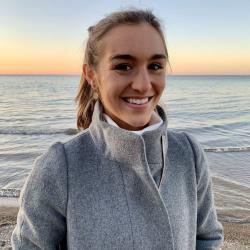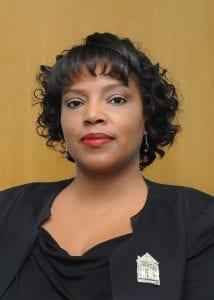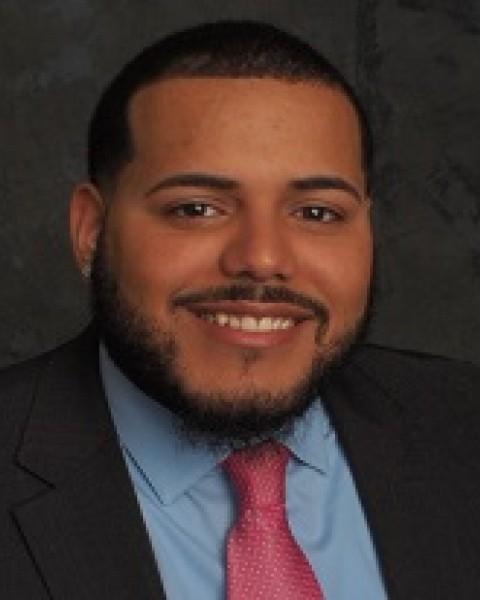How Do Carsey’s Graduate Programs Prepare Students for Nonprofit Management and the Nonprofit Sector?
The Need for Qualified Nonprofit Managers
In the United States, 1.3 million charitable nonprofits play critical roles in feeding, sheltering, educating, and strengthening our nation’s communities. The need for these organizations – and the services they provide – grows on a daily basis. Fortunately, the number of nonprofit organizations in the U.S. continues to grow as well.
From 2005 to 2015, nonprofit organizations registered with the IRS increased 10.4 percent. In 2015, the nonprofit sector contributed an estimated $984.4 billion to the U.S economy – 5.4 percent of the nation's gross domestic product. And in 2018, roughly 63 million Americans volunteered their time to nonprofits. Just a look at the numbers shows how impactful these organizations are to people living in the U.S.
At the helm of each of these nonprofits is typically a manager responsible for overseeing the organization and the operational responsibilities involved. The nonprofit manager must serve as a kind of organizational Swiss Army knife, handling finances, coordinating fundraising, organizing volunteers, reporting to boards and backers, and making critical organizational decisions. At the Carsey School of Public Policy, the holistic curriculums of our master's degree programs aim to prepare students for nonprofit management roles by teaching them core, foundational principles and immersing them into experiential learning opportunities.
Increasing Wellness Among Granite Staters: Bobbie Burgess

Headshot of Carsey Alumni Bobby Burgess
Bobbie Burgess '19G earned a Master in Public Policy (MPP) from the Carsey School before directing the communications at the nonprofit New Futures, which aspires to improve health and wellness policies across the state of New Hampshire.
Burgess was unsure of her career trajectory upon completing her MPP.
"I knew I was interested in this underlying idea that I wanted the work I did to benefit other people," says Burgess. "I also knew I want to be an advocate for fair pay – for an environment where a person feels like they're getting paid the way they should at the end of the day and they can raise a family and maintain a decent living."
I knew I was interested in this underlying idea that I wanted the work I did to benefit other people. I also knew I want to be an advocate for fair pay – for an environment where a person feels like they're getting paid the way they should at the end of the day and they can raise a family and maintain a decent living.
Through the MPP program, Burgess says she developed a broader understanding of the basic needs of New Hampshire residents and how best to equip children, families, and older adults living in the state to succeed.
"Through Carsey’s program, I think I developed a broader understanding of what it means to be a thriving individual in New Hampshire specifically."
In New Hampshire alone, 15% of the population's workforce is employed by a nonprofit. Thirty-nine percent of the nonprofits in the state focus their missions on health and human services.
Bobbie’s interest in working in nonprofit management began with Carsey's MPP program, through which she was able to build her network in both the nonprofit and for-profit sectors.
"There [are] so many different career paths you could take, and it was nice being introduced to all of them," Bobbie said of the program. "I could see myself doing a little bit of everything, but I was really drawn to the nonprofit world because the individuals that we met were always so involved and interested in what they were working on."
One unique aspect of Carsey's Master in Public Policy program is the Washington, D.C., Colloquium, during which students meet with leaders in Congress, the White House, government agencies, political parties, advocacy groups, think tanks, and more. Bobbie describes her colloquium experience as an opportunity to meet some of Washington's biggest movers and shakers and a chance to ask them about different aspects of their careers and organizations.
"We met with like 10 different people every day and would sit down with them for two hours or more, asking them questions about their work," describes Bobbie, adding that through those meetings, her colleagues could follow up with the people they met afterwards.
Ultimately, the MPP program at Carsey introduced Bobbie to a multitude of opportunities and career paths and inspired her "that there needs to be more work done in the health policy world, especially in the nonprofit space."
Making Housing Affordable in New Orleans: Andreanecia Morris

Headshot of Carsey MCD alumni Andreanica Morris
Master in Community Development (MCD) graduate and Carsey School faculty member Andreanecia Morris serves as Executive Director for Housing NOLA, which focuses on building collaboration around solving New Orleans housing crisis. New Orleans has some of the highest rates of rent stress in the country, an issue exacerbated by the COVID-19 pandemic.
Andreanecia has spent much of her career working in the affordable housing sector. She was lead organizer of the Greater New Orleans Housing Alliance in 2007 and has served as president of GNOHA since its incorporation in 2012. She also chairs the HousingLOUISIANA Alliance Network, serves on the Federal Reserve Board's Community Advisory Council, and was named New Orleanian of the Year by the Gambit newspaper for her work in affordable housing.
When Andreanecia began the community development master's program at Carsey, she already had nearly a decade of experience managing nonprofits. However, the classroom skills she learned, as well as the project opportunities, allowed her to truly apply what she was learning.
"It was really helpful to look at some of the foundational elements of my organizations," describes Andreanecia while completing the program, leading two nonprofits, and founding a third. "[The program] forced me to evaluate a lot of the things I was already doing and things I planned to do and really determine if they made sense."
It was really helpful to look at some of the foundational elements of my organizations. [The program] forced me to evaluate a lot of the things I was already doing and things I planned to do and really determine if they made sense.
"There are two courses that deal directly with nonprofit management and financial management and design. I actually started a nonprofit while I was in that class and used that in developing my organization," she adds. "I was actually able to use the coursework in order to set up things like payroll and budgeting. And a lot of those things I was taught were not how I normally set things up, so I actually adopted some of those financial management strategies inside my other two organizations."
Just as important as what she learned was the flexibility of the MCD degree program, says Andreanecia, especially given her busy schedule.
"The graduate program was designed to be entirely online even before COVID hit," she says, adding that the two weeks she did spend on campus in summer of 2019 were a great opportunity to build friendships and relationships with her cohort members, but the online elements of the program truly prepared her for operating during the COVID-19 pandemic.
MCD Director Michael Swack Interviews MCD Graduate Andreanecia Morris
Supporting Diversity and Access for All: Andrés Mejia

Headshot of Carsey employee and alumni Andres Mejia
Andrés Mejia is an alum of the Carsey School's Master in Community Development program and former program manager, and current fellow, with NH Listens who currently serves as the Director of Diversity, Equity, Inclusion and Justice for the Exeter Region Cooperative School District.
Andrés has a long history of working in the social justice sector and for supporting programs centered around diversity, people of color, and the LGBTQIA+ community at the University of New Hampshire and in the New Hampshire Seacoast region. Among his achievements, he was inducted into the 2019 UNH Alumni Diversity Hall of Fame; served on the UNH President's Commission on the Status of People of Color and the University Commission on Community, Equity & Diversity; and worked as a staff advisor to UNH student groups like the Black Student Union and Queer and Trans People of Color.
Similar to Andreanecia, Andrés ran an organization for three years – as coordinator of the UNH CONNECT program – before he began his graduate degree in community development at the Carsey School. He cites the hands-on learning aspect of the program as key to helping him build upon existing skill sets.
"You actually get to practice what you're learning – going and meeting with organizations, focus groups, and creating user frameworks and models to make a plan and then implementing that plan," he adds.
You actually get to practice what you're learning – going and meeting with organizations, focus groups, and creating user frameworks and models to make a plan and then implementing that plan.
The MCD program directly influenced his career and drive to work in education as well.
"The skills I've learned in my masters program – like practical work like creating a Gantt chart, strategic plans, outcomes, and activities – I've been able to take that and use it when I go to schools and when I work within communities," says Andrés. "Plus, I was connected to several important figures within Boston and in the nonprofit world."
As a growing area of public service, nonprofit management is critical to delivering necessary services to some of the nation’s most vulnerable populations. The COVID-19 pandemic has only exacerbated the pipeline for these services – resulting in the need for more trained professionals organizing and leading service delivery.
The master’s degree programs available from the Carsey School of Public Policy focus on setting students up for success within the nonprofit sector. This is done through a unique curriculum – taught by proven practitioners – and hands-on project assignments and internship opportunities that allow for the application of that curriculum. Are you ready to learn more?
FAQs
Absolutely! But it helps to have a broader education which integrates the key aspects needed for sustainable community development (health, income, public policy, etc…) including nonprofit management as an area of focus which you can apply across a range of sectors and settings. That’s where the Carsey School’s Master in Community Development Policy and Practice degree stands out. In addition to developing project design through evaluation skill sets, you’ll learn about community medicine and epidemiology, organizational management and leadership, policy analysis, policy making, and sustainable development – all while implementing a capstone project and applying classroom principles within your own community.
The Master in Community Development program at the Carsey School is led by Dr. Michael Swack, a highly regarded innovator in the community development finance industry, which serves low-income communities. Dr. Swack directs the Center for Impact Finance at the Carsey School and possesses over three decades of experience working in this field and educating practitioners in sustainable community development practices.
Through the MCD program, you’ll be connected to other practitioners – your cohort members, instructors, guest speakers, and others – from a range of different fields and regions around the world. You’ll also meet with the heads of community-based partner organizations, building your network in the process.
In addition to completing core courses organizational management and leadership, policy analysis, policy making, and sustainable development, you’ll have the option of completing elective classes focused on such topics as community development finance, global health, housing policy and development, and similar areas. Through electives and the experiential capstone project, you’ll have the opportunity to tailor the program to your career trajectory.
One major advantage is learning the policy and practice of sustainable community development from seasoned professionals. The Carsey School faculty are just that – they come from a variety of different fields of expertise and sectors, with decades of experience which is shared within the classroom.
Another advantage of the Master in Community Development program is the opportunity to design and implement a capstone project specifically for your nonprofit. As you work and apply classroom knowledge, skills and tools within your organization, you can also determine areas for improvement or long-term projects and complete one of those initiatives as part of your MCD capstone project.